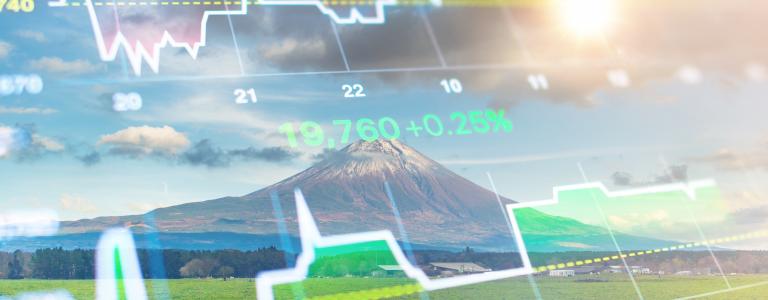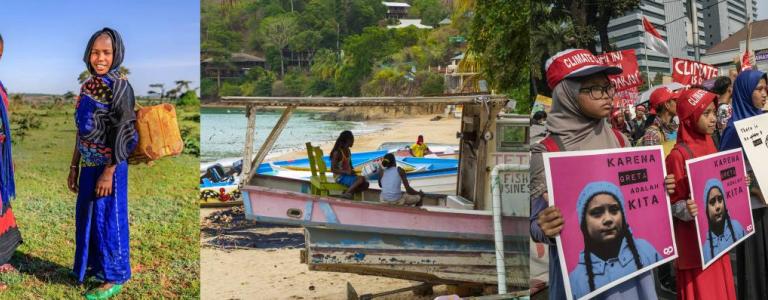Measuring Nature for Post-COVID-19 Economic Recovery
In the face of multiple health and environmental crises, the inefficiencies of GDP as the main measure of economic health and government policy are strikingly apparent. The Measuring Wealth to Promote Sustainable Development Project is pushing for a holistic account of nature's assets to truly "build back better" from COVID-19.
As the global economy slowly recovers from the pandemic and governments continue to deploy unprecedented stimulus, an underlying problem persists. Governments are banking on using gross domestic product (GDP) as the main means of assessing recovery from the pandemic. That would be a mistake.
GDP considers the total value of a country’s goods and services but fails to extend into long-term measures of prosperity. To fully “build back better,” metrics of national well-being should examine income distribution, environmental degradation, social inclusion, education etc.—in brief, the underlying factors that make it possible for people to even trade goods and services. For years, economists have spoken on the weaknesses of GDP as a measure of national well-being, and the pandemic has only magnified its inefficiencies.
Recent developments in accounting for nature’s assets as economic resources have pushed the needle further on sustainable metrics of economic progress. The Dasgupta Review, a major study commissioned by the United Kingdom government, stressed the need to put a “price on nature.” That is, natural capital should be valued on par with other forms of capital. It argues that society’s rate of natural resource extraction has exceeded the ability of nature and its bounties to regenerate the supply.
The UN also adopted the System of Environmental-Economic Accounting—Ecosystem Accounting (SEEA EA) that gives countries a baseline to measure the state of ecosystems. These are just a few of the systems that offer complementary measures to GDP to better guide government policy-making.
For years, economists have spoken on the weaknesses of GDP as a measure of national well-being, and the pandemic has only magnified its inefficiencies
The Measuring Wealth to Promote Sustainable Development project aims to help governments adopt a more comprehensive accounting of a nation’s assets to understand if they are truly making progress. It includes natural capital, produced capital, human capital, financial capital, and social capital.
In November 2016, IISD released a report on Canadian wealth. It introduced the concept of “comprehensive wealth” and the emerging trends within Canada. Another report released in 2018 dove deeper into the five capital assets to highlight areas of concern.
In a recent expansion of the reports, IISD interviewed respected economists to share their thoughts on the shortcomings of GDP as the main measure of economic progress. The videos were filled with insights on countries’ paths to long-term sustainability from Pushpam Kumar, Chief Economist at the United Nations Environment Programme; Matthew Agarwala, Environmental Economist at the Bennett Institute for Public Policy, Cambridge University; and Grzegorz Peszko, Economist at the World Bank.
As a result of IISD’s outreach to the Canadian government, the Comprehensive Wealth project was cited in Canada’s Ministry of Finance interim report on developing a Quality-of-Life Framework. The report is driven by the Minister of Middle-Class Prosperity’s mandate to develop alternative measures of prosperity for Canadians—similar to those adopted in New Zealand. It speaks to the evolving debates on how we measure success and value the tangible and intangible resources in our society. By re-examining our interactions with nature, we can create a clearer picture of our present reality.
In July 2021, IISD conducted a High-Level Political Forum for Sustainable Development (HLPF) learning event to support evidence-based decision making as societies move to “build back better” after the COVID-19 pandemic.
Later in the month, IISD also organized an HLPF side event as panellists discussed expanded wealth measures and their utility for post-COVID-19 recovery and the advancement of the sustainable development goals.
For the next steps, the Measuring Wealth to Promote Sustainable Development Project is partnering with researchers in Ethiopia, Trinidad and Tobago, and Indonesia. Namely, the Mekele University in Ethiopia, Universitas Indonesia in Indonesia, and the University of West Indies in Trinidad and Tobago. Together, we are working toward advancing expanded measures of national wealth within each country’s socio-economic contexts.
With our partners, we hope to build interest and national capacity to move beyond GDP as the main measure of prosperity and integrate our findings in policy creation and national decision making. By 2022, a new report re-examining Canadian data and progress on sustainability will also be released.
As global societies look toward a sustainable post-COVID recovery, it presents a unique opportunity to rethink how we value nature. Preventing future pandemics means honouring the indelible links between humans and the natural environment. It is time for a new metric that accounts for varied aspects of national progress and our most pertinent global challenge—climate change.
We must change our interpretations of economic success if we are to stay ahead of irreparable damage.
You might also be interested in
Measuring the Wealth of Nations: A review
This paper provides a brief overview of recent efforts by international agencies and academic institutions to develop and apply comprehensive wealth measurement tools. Our review is limited to examples of comprehensive wealth measurement as applied to several countries, so it does not include work on specific capital estimates, applications to a small number of countries, or theoretical research/framework development.
Comprehensive Wealth in Canada 2018 – Measuring What Matters in the Long Term
Comprehensive wealth measures the country’s produced, natural, human, financial and social capital.
Comprehensive Wealth in Canada—Measuring what matters in the long run
This report seeks to introduce the concept of comprehensive wealth to Canadians and outline why it should be considered an essential complement to the other measures such as gross domestic product.
Founder of Midsummer Analytics to speak at FSU’s South Asian Media and Cultural Studies Conference
Robert Smith, founder of Midsummer Analytics and a senior associate with the International Institute for Sustainable Development, will speak at Florida State University on Thursday, Feb. 2, about avenues to replace gross domestic product (GDP) as the central measure of a country’s progress.


